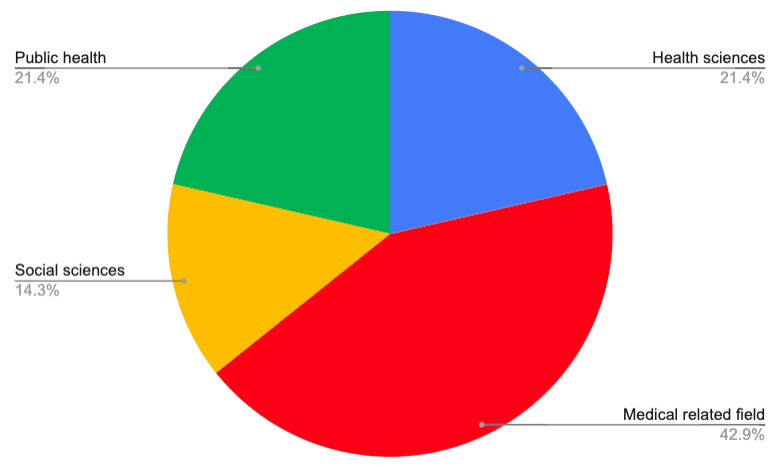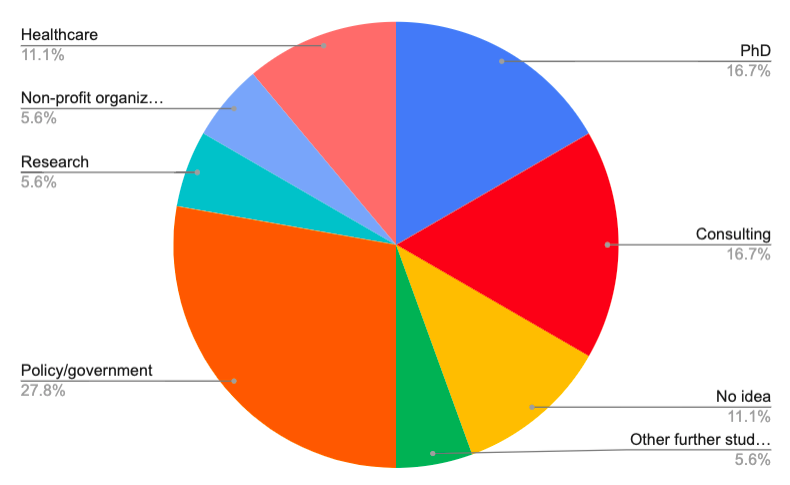
Is the Public Health HPP stream right for you?
The 2021 applications are open and I know it can be difficult to determine which program is right for you. Since my class is the inaugural class for the Health Promotion and Prevention (HPP) stream, it can be even more difficult to gain insight into what the program is about. I have surveyed my classmates in the HPP stream and compiled their thoughts about this program that hopefully can help you determine if this is a good fit for you!
What did you study prior to this program?

What was your primary purpose for picking the HPP program?
“I really wanted to learn practical skills for the workforce regarding health promotion such as project management, policy development, intervention implementation etc.”
“I just wanted to reduce the proportions of people seeking care while they are sick using health promotion and prevention interventions”
“The aspect of practical work, working with implementation in communities, and focus on upstream public health
“I wanted to go to a good university and to learn about public health in a practical and applied way”
“To combine my knowledge from social sciences with public health and epidemiology in order to successfully work with health promotion in the future. I am especially interested in the upstream determinants of health and I believe that this combination of knowledge will enable me to target them and the health inequities that they cause.”
“From the beginning I was looking for a program that taught public health through a socio-ecological lens and focused on health promotion rather than clinical epidemiology. Karolinska presented the opportunity to pursue that goal by offering two independent streams. As an international student, I was also excited by the idea of moving to a new country to gain unique experiences outside of school that I would not get from staying in my home-country.”
“I was looking for an applied field where to learn how to take action about public health issues of our time together with lay people, not one involving “only” research or surveillance. Also, I want to be in contact and work with people and communities in my career.”
“I was interested in learning how to implement public health interventions and learning to do research.”
What has been your favourite part of this program?
“I love getting to collaborate with my classmates from all over the world, from a variety of different academic and cultural backgrounds, which is pivotal to a diverse field like health promotion.”
“Learning about qualitative methods for research and implementation of interventions.”
“In general, the track-specific courses in HPP in development and implementation of public health interventions have been very good. The course leaders of those courses have been very engaging and approachable, and the courses have been useful and relevant. I have also appreciated the diversity of our international class and the different experiences and inputs my colleagues have brought.”
“As an international program, I have really appreciated forming relationships and networking with students and public health professionals from a wide range of backgrounds. It has truly opened doors academically and professionally and I love knowing that there will be future opportunities to work in different countries around the world.”
“The presentations from research groups working with Primary Health Care services outreach, and the study visits to regional health promoting units (which were organised within an epidemiology course though…).”
“In addition to the basic epidemiology, we learned a lot about the qualitative methods and theories/models/frameworks to grasp, illustrate, and investigate how one phenomenon is caused.”
“Learning how to underpin intervention and implementation development with theory. This makes it much more systematic.”
What about this program was different than you expected?
“Yes it seems different from what I was expecting. I was thinking that it’s going to be more of practical issues but KI is a research institution and seems all courses there are taught from the perspective of research. But this I am enjoying too and it’s building up my skills in research”
“I was expecting more emphasis on learning these skills for a work force setting, rather there has been a strong emphasis on research.”
“I learned so many new concepts with a sufficient pace, and the program was very well oriented and structured that facilitated the learning process”
“It is very much based on research happening in KI and in Sweden. We barely hear about interventions other than diet and physical activity or smoking. Most of the examples come from high income settings and I was expecting to get a broader picture”
“The program overall has been more research focused than I expected and hoped for, since I plan to work within the public or non-profit sector with development and implementation of interventions.”
“It’s way too advanced and clinical but broadens one’s knowledge which is an advantage to the student”
“It is very focused on research and not as applied as I would have expected. There’s still hope as we have a last upcoming track-specific course which is supposed to be “applied”, but one course in two years is not enough. Also, too much epidemiology. It is good to understand how evidence is produced and its value etc., but I think health promoters should be more familiar with concepts and theories regarding society, politics, empowerment… and more in touch with social scientists than clinical scientists.”
“The program is completely research-oriented; we, therefore, need to learn practical knowledge elsewhere on how to effectively manage ongoing interventions, trouble-shooting, human resource, finance, and so on.”
What do you want to do after you graduate?

What would you tell a future student considering this program?
“Evidence-based public health prevention and promotion is a sustainable way to reduce disease burden and promote good health. You are surely thinking of coming to the right program.”
“Enjoy the HPP subjects. Make friends for life among your classmates. Network at KI and beyond. Explore workshops and events at others unis and Norrsken, H2 Health Hub, Epicenter etc. Enjoy your time in Stockholm – it’s a great place to study and live.”
“This program focuses on the fundamental skills for public health research (ethics, statistics, analysis, scientific theories) which are very important, but if you are looking to study or discuss specific areas of public or global health e.g climate change, mental health etc. another program may be a better fit”
“We learn a lot of valuable skills in this program, but be prepared for most things we learn to be within the context of research.”
“If you are interested in pursuing research in the future, this program is great. It prioritizes building a comprehensive toolbox of skills that will allow us to successfully conduct high-quality research in our fields. That being said, these skills will also be invaluable for those pursuing other paths in public health and skills that employers will be looking for. I think something to really take into consideration is that the courses for the whole program are set in stone– there are no opportunities to take electives that concentrate on specific public health topics (i.e. climate change, migrant health, disaster management, etc.). If you know you would like to pursue public health promotion but are hoping that your masters will be your opportunity to be exposed to a range of topics to discover your true passion, you need to look at the courses offered and decide if this program is for you. Different schools offer different program structures (practicums vs. thesis, electives etc.) which you need to think about based on your interests, academic goals, and career path.”
“If you are looking for a program with a broad scope, highly applied and/or interdisciplinary, this program will not satisfy you.”
“If you want to learn how to do research on health promotion (especially from a clinical, top-down and quantitative point of view), this is the program for you.”
“Public health is political, cultural, statistical, scientific, contextual….. a multifaceted field. You will definitely enjoy various aspects of public health research in Sweden wherever you come from.”
Additional thoughts?
“I am so happy that I chose this program and I am enjoying it.”
“A short course on systematic reviews and meta analyses would be a useful tool for future HPP practitioners.”
“I am enjoying the program!”
“Being in a class with diverse professions, nationalities, and experiences is invaluable. I’ve learned at least as much from conversations with classmates as I have from lectures and schoolwork. Be sure to engage with your peers to get the most out of the program.”
I hope this gives you more insight into whether the HPP stream aligns with your academic and career goals. Please reach out if you have any questions!
Lauren
Lauren Wiebe- Health Promotion and Prevention
Hi! I am Lauren, I was born and raised in Canada, and you probably will hear me talking about how much I love Canada, especially the mountains. I am the blogger for the Master's Public Health Sciences Health Promotion and Prevention stream and I am excited to share my experiences with you!

0 comments